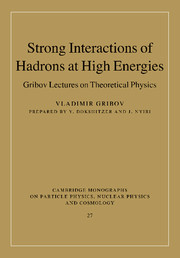Description
Strong Interactions of Hadrons at High Energies
Gribov Lectures on Theoretical Physics
Cambridge Monographs on Particle Physics, Nuclear Physics and Cosmology Series, Vol. 27
Author: Gribov Vladimir
Language: English
Subject for Strong Interactions of Hadrons at High Energies:
Approximative price 73.89 €
In Print (Delivery period: 14 days).
Add to cart
Strong Interactions of Hadrons at High Energies
Publication date: 10-2012
Support: Print on demand
Publication date: 10-2012
Support: Print on demand
Approximative price 133.52 €
Subject to availability at the publisher.
Add to cart
Strong interactions of hadrons at high energies: Gribov lectures on theoretical physics
Publication date: 11-2008
488 p. · 17x24.4 cm · Hardback
Publication date: 11-2008
488 p. · 17x24.4 cm · Hardback
Description
/li>Contents
/li>
Vladimir Gribov was one of the founding fathers of high-energy elementary particle physics. This book derives from a lecture course he delivered to graduate students in the 1970s. It thus provides today's graduate students and researchers with the opportunity to learn from the teaching of one of the twentieth century's greatest physicists. Its content is still deeply relevant to modern research, for example exploring properties of the relativistic theory of hadron interactions in a domain of peripheral collisions and large distances that quantum chromodynamics has barely approached. It covers a combination of topics not treated elsewhere, whilst remaining self-contained and thus accessible at graduate level. In guiding the reader, step-by-step, from the basics of quantum mechanics and relativistic kinematics to the most challenging problems of high-energy hadron interactions with simplifying models and physical analogies, it demonstrates general methods of addressing difficult problems in theoretical physics.
1. Introduction; 2. Analyticity and unitarity; 3. Resonances; 4. Electromagnetic interaction of hadrons; 5. Strong interactions at high energies; 6. t channel unitarity and growing interaction radius; 7. Theory of complex angular momenta; 8. Reggeon exchange; 9. Regge poles in perturbation theory; 10. Regge pole beyond perturbation theory; 11. Reggeon branchings; 12. Branchings in the s channel and shadowing; 13. Interacting reggeons; 14. Reggeon field theory; 15. Particle density fluctuations and RFT; 16. Strong interactions and field theory; References; Index.
© 2024 LAVOISIER S.A.S.




